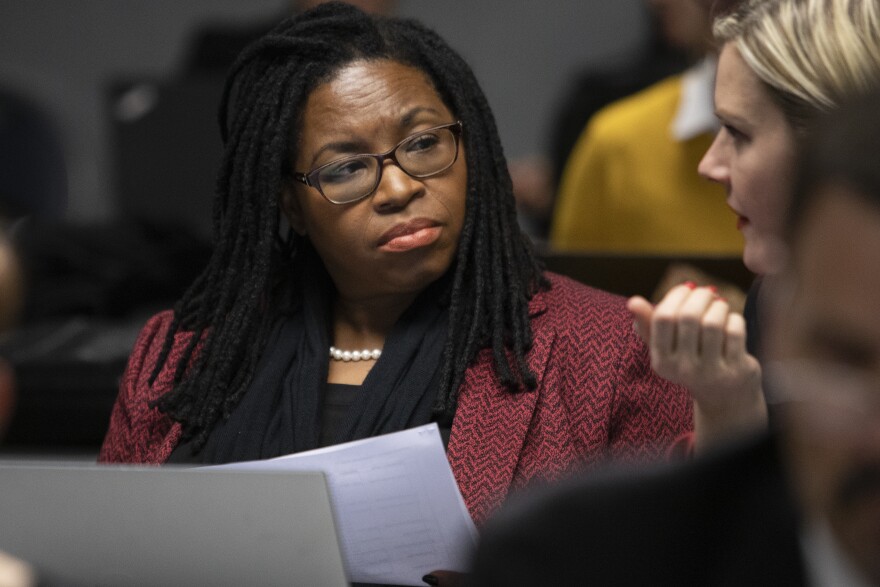Para leer una versión de este artículo en Español haga click aqui.
When the Austin Independent School District announced it needed to close and consolidate schools back in February, it also posted a job for its first-ever chief equity officer.
But Stephanie Hawley didn't start in the position until August, when the first draft of the school closure plan was almost complete. And she had been on the job for only three months when the board voted to close four schools.
The role of the chief equity officer is to help AISD leaders make decisions with equity in mind – including decisions on consolidating schools.
Starting a department from scratch is daunting, says Chris Chatmon, senior adviser of equity and inclusion for the Oakland (Calif.) Unified School District.
"The audacity of what we're being asked to do is pretty extraordinary. We're talking about really dismantling a mindset that's been fully baked for generations."
“We are an outlier,” he says. “The audacity of what we’re being asked to do is pretty extraordinary. We’re talking about really dismantling a mindset that’s been fully baked for generations, both in the institution, the system and structure, and black, white brown or otherwise, we’ve been trained and brought up in it.”
Chatmon says even though Oakland has had an equity department for years, it has by no means solved the issues that plague districts across the country.
“Oakland has not figured it out," he says. "We’re just 10 years in."
Oakland is 1,700 miles away from Austin, but the two school systems have a lot in common: Both cities are dramatically gentrifying, making it harder for low- and middle-income families to live in them. Both have watched school enrollment drop, and the majority of students who remain are children of color and often live in poverty.
Chatmon says it’s these demographics that make an equity officer necessary to a school district. It's also hard work – work Austin ISD is embarking on, systematically, for the first time.
The Road To Hiring An Equity Officer
There was no easing into the job for Hawley. She was immediately attending community meetings on the school closure plan, gauging the public’s reaction.
At the same time, she was evaluating the plan itself.
Last week, the district released her report, which was written before the Nov. 18 vote to close four schools. AISD had said the closures were equitable because by consolidating schools, there would be more money for academics and new buildings. But in her report, Hawley said closing schools was not an equity strategy. She also criticized the plan's rollout.
And this is not the end of the closure conversation. The district says next semester it will revisit whether to close eight other schools pulled from the original list.
Now, Austin ISD is at a turning point. Will Hawley's report have any impact on this next phase?
'I'm Not Superwoman'
As she looks toward next semester, Hawley says she mainly views her job as a coach.
“I’m not superwoman,” she said. “I'm not the person with a cape that runs to every issue or incident. But I try to help people develop their capacity to see through a race equity lens, through a social equity lens, so they can do their work in that way. So, I don't have to be present and everywhere.”
"Part of my work and my office's work is to give people the tools to actually have the conversation, to be able to say the word race, racism."
But she says she sees major issues with the way minority and low-income children are being educated in the district. She says she is “radically hopeful” that once she trains the superintendent, school board and executive staff to think about equity in all their decisions, that training could reach principals, teachers and students.
But Hawley says this type of change won’t happen overnight.
“These are about difficult conversations,” she said. “Part of my work and my office’s work is to give people the tools to actually have the conversation, to be able to say the word race, racism. These are difficult things because, again, we’ve been taught this isn’t polite conversation, but meanwhile racism is predictably destroying black and brown children, low-income children, children placed in special education.”
Undoing '21st Century Racism'
Racism in Austin's schools isn’t as overt as it was in the past. It’s more subtle, Hawley says. At the Nov. 18 board meeting, she referred to the school closure plan as “21st century racism."
And that’s the hard part of her job – training staff to see these subtleties.
In her equity report, she gives examples: district staff telling low-income parents what's best for their children, staff not engaging with immigrant communities in a way that makes them feel included, and staff not considering the history of racism in the city and school district when choosing schools to close.
During the closure discussion this fall, AISD parent Valerie Sterne asked why money was spent on renovations at a Central Austin school with mostly white, affluent students, while nearby schools were chosen for closure.
“I don’t doubt that Lee [Elementary] had justification for building that wing,” Sterne said. “But the truth is most schools in this district, or the vast majority of them, could justify new classrooms. So many schools have so many kids in portable buildings.”
Sterne said the lack of transparency in the process shows the district doesn't make decisions with equity in mind.
It’s these kinds of practices Hawley says she wants to address.
She plans to train district administration to look at their financial, academic, family engagement and communication strategies and make sure a decision doesn’t hurt the same people who have always been hurt and help the same people who have always been helped.
Getting An Outside Look
Chatmon has worked for a few superintendents during his time in the equity department at Oakland Schools. He says doing this kind of work often means being patient and re-defining what success looks like.
“You have to pick and choose your point of entry or your fights,” he said. “You kind of pick and choose where within the system, from classroom to boardroom, do you kind of build these layers of consciousness and wins.”
"The problem of school closures should not have a group of people, senior leadership, in a room coming up with, 'This is what we're going to do."
Oakland USD is also in the process of closing schools. Chatmon says he proposed a strategy at the beginning of the process that started with talking to the community about how to restructure the district.
“My strategy was take the problem to the people," he said. “Nothing about us without us – meaning, we can solve our own problems. The problem of school closures should not have a group of people, senior leadership, in a room coming up with, ‘This is what we’re going to do.’”
But OUSD didn’t listen to him.
Chatmon says while it’s frustrating, he’s still working to bring equity ideas to the table.
“So school closures has to be an option," he says. But does it have to look the way it always has? "No."
Hawley says one of the "wins" she’d like to accomplish this school year is hiring a third party to do an equity audit that looks at every department – finance, academics, communication – to see what practices are helpful and what are harmful to minority and low-incomes students.
She says Superintendent Paul Cruz seems open to the idea.
“I tell people until I know how deep the mud is, it’s difficult to plan how to get out,” she said. “We need a third party to come in and share with us what we’re doing well so we can build upon it and help us disrupt that which is not serving our kids well.”
Got a tip? Email Claire at claire@kut.org. Follow her on Twitter @ClaireMcInerny.
If you found the reporting above valuable, please consider making a donation to support it. Your gift pays for everything you find on KUT.org. Thanks for donating today.







